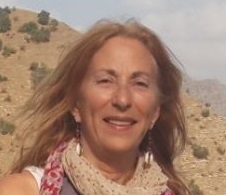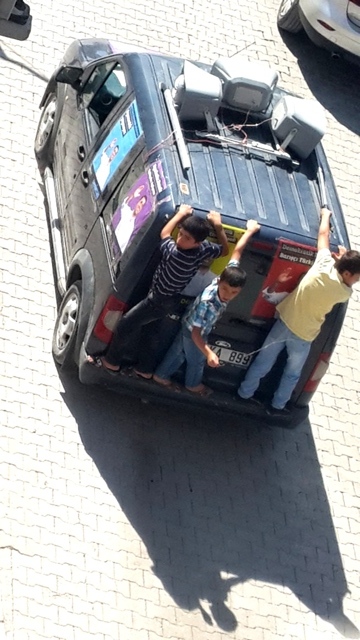
By Amy L. Beam, Ed.D:
On August 10, 2014, Turkey will vote for a new President. The People’s Democratic Party (HDP) candidate, Selahattin Demirtaş is sure to win the vote in Sirnak, in southeast Turkey. This is the first time in Turkey’s history that citizens will have the opportunity to vote for a Kurdish President.
There is a magic in the air, as little children chase after the Demirtaş van projecting his messages to the people. The psychological impact has sparked hope in young Kurdish kids that they, too, can be included in a democratic Turkey.
But Selahattin Demirtaş is not a candidate for Kurds only. Demirtaş is running on a platform of ethnic pluralism, religious freedom, and women’s rights which are the foundation for a democracy . . . while Erdoğan continues to push the nationalistic line of “Turkishness” that denies expression of cultural diversity. The irony is that Erdoğan’s AK Party’s denial of diversity, far from unifying the country, is actually the root cause of the deep division that exists today in Turkey between Kurds and Turks. Over 20 million Kurds represent 20% of Turkey’s population.
Internal peace cannot be achieved under the current state policy, enshrined in draconian legislation, that suppresses press freedom and denies the basic human right to express one’s cultural ethnicity.
In contrast to PM Erdoğan’s position, Demirtaş’ aim is “to build a new life in which all groups in Turkey can co-exist in freedom. The president we dream of will be on the street, together with the people. He will stand by those who can’t make their voices heard because of ethnic, religious, gender and class-based discrimination. Turkey is at a crossroads. Either the state’s authority will be consolidated, or the country will opt for radical democratic change.”
Demirtaş has frequently visited Kurdish-inhabited southeastern Turkey’s towns and villages for years to listen to constituents’ needs. On a regular basis he consults with families of the 34 victims of the Roboski massacre of December 28, 2011. Turkey flew two F-16s over the border of Roboski, Turkey, into Iraq and killed 34 innocent men and boys. Turkey’s government did not deny its actions. It labeled it an “operational mistake,” although evidence points strongly to a planned attack with U.S. complicity. A cross-border attack on the Iraq side requires the approval of the Prime Minister: Erdoğan. It could not have been otherwise.
Erdoğan’s position on Roboski as reported by Bianet News, on May 25, 2012, “Whoever is still bringing up the Uludere issue is actually related to terrorist organizations.”
This sort of unveiled threat from the Prime Minister should not be taken lightly. In 2009, two historians, Ercan Öksüz and Oktay Candemir, were sentenced to prison for publishing an interview with a 94-year-old Dersim massacre survivor. In 2011, PM Erdoğan apologized for the Dersim massacre of 1937-38 and opened the Dersim archives. Yet Erdoğan’s position on the Roboski massacre remains unchanged in spite of his insistence that there is press freedom in Turkey. Roboski families demand that the person(s) responsible for the decision to bomb the 34 civilians be revealed.
In Sirnak, the capital of the southeastern province of Roboski, the billboard in the center of town that previously listed the names of the 34 Roboski victims has been replaced with a smiling Erdoğan campaign poster.
But the Roboski Massacre cannot be covered up with a campaign poster.
On July 28, 2014, candidate Demirtaş journeyed to Roboski again where he addressed over 5,000 people gathered on Eid to remember the victims of Roboski and Gulyazı and rededicate their efforts to seeking justice and advancing democracy.
Roboski families rejected a settlement of $1500 US dollars (3000 TL) per victim. Their case for justice is being appealed in a high court in Ankara.
Analysts project that Erdoğan cannot win the Presidential election without the Kurdish vote. In recent weeks he has courted the Kurdish vote. But his actions, mostly symbolic, have fallen far short of meeting Kurdish demands for justice and democracy.
On March 27, a Turkish court released 45 defendants in the infamous KCK political trials, including journalists and political prisoners. On July 15, 2014, Sirnak celebrated the release of 25 Kurdish prisoners in the KCK trials. The case was dismissed. On July 18, seven more Kurdish political prisoners were released in the KCK trial in Mersin after spending 3 years in prison. Their case was also dismissed, but thousands of Kurdish activists remain in prison.
PM Erdoğan has introduced a plan to parliament for Kurdistan Workers’ Party (PKK) members to leave the PKK and return to their homes, but the anti-terrorism laws remain in-tact and the PKK remains listed as a terrorist organization making peace negotiations with the PKK virtually impossible. The law, referred to as the “Active Remorse Law,” requires PKK members to denounce their affiliation with their party. This fig leaf from Erdoğan might be interpreted by some as more of an effort to break the Kurdish resistance movement than to grant Kurdish demands for their human rights. It is still necessary to remove the PKK from the terrorist list for peace negotiations to proceed.
According to the ‘Withdrawal and Resolution Process Monitoring Commission’ established by the Human Rights Association (IHD), in the last year the decision has been taken to construct 341 new military posts and bases during the cease-fire.
After a one-year cease-fire, soldiers in Lice, a district of Diyarbakir (Amed), shot and killed two peaceful demonstrators protesting the building of another military base. One victim was a 26-year-old father shot in the back; the other was a 50-year-old woman.
On July 29, 2014, this writer encountered tear gas in both Cizre and Silopi, south of Sirnak. Kurdish families were peacefully enjoying their Bayram holiday in the park when police fired tear gas to disperse them. Police and Jandarma military tanks with armed gun turrets continue to drive through the centers of Kurdish towns on an hourly basis. The military provocation continues unabated against the Kurdish civilian population in eastern and southeastern Turkey.
Turkey is not at war. . . is it? Why must it occupy the towns and villages of its own citizens in eastern Turkey and build military bases with armed watch towers peering into the homes of its peaceful residents?
The irony of the rhetoric from Israel’s Prime Minister Netanyahu and Turkey’s Prime Minister Erdoğan cannot be missed. PM Erdoğan must be supported for publicly denouncing Israel for its savage attack in the last month on Palestinians in Gaza, calling it genocide. Prime Minister Netanyahu has previously suggested Erdoğan should recognize the inherent human rights of Turkey’s own Kurdish citizens before accusing Israel of human rights abuses. Both elected leaders have divided their countries based on nationalistic rhetoric and animosities . . . many call it fascism . . . rather than a call for pluralism and human rights for all people.
HDP presidential candidate Selahattin Demirtaş offers all Turkish citizens, of every ethnicity and religious belief, the greatest hope for democracy, human rights, and peaceful solutions in the Middle East.
Amy L. Beam promotes tourism to eastern Turkey at Mount Ararat Trek (http://www.mountararattrek.com) and writes occasionally on Kurdish issues. Follow her on twitter @amybeam
.jpg)









Good News : Kurdish independence case will be presented to the United Nation.